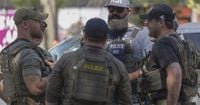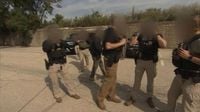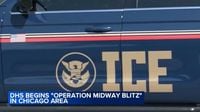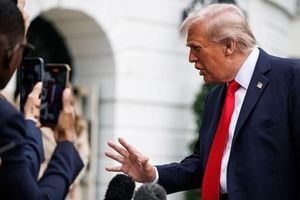On Monday, September 8, 2025, the Department of Homeland Security officially launched "Operation Midway Blitz" in Chicago, marking the beginning of a sweeping federal immigration enforcement surge that has sent ripples of anxiety and outrage through the city. The operation, which federal officials say is aimed at apprehending the most dangerous undocumented immigrants, has quickly become a flashpoint in the ongoing debate over immigration policy, sanctuary cities, and public safety. As federal agents fan out across neighborhoods and community leaders mobilize in response, the city finds itself at the center of a national controversy—one that shows no sign of abating.
According to ABC News, the operation began with a coordinated effort between Immigration and Customs Enforcement (ICE) and the Bureau of Alcohol, Tobacco, Firearms and Explosives (ATF). Agents, heavily armed and operating from undisclosed locations, targeted suspected members of the Tren de Aragua gang, a group accused of trafficking firearms linked to violent crimes in Chicago. Jonathan Maniff, ATF special agent in charge, explained, "A lot of these firearms came back to very violent shootings in Chicago, homicides, carjackings, aggravated batteries." So far, three suspected gang members have been arrested, and authorities say they have identified 30 suspected gang members selling firearms in the area.
Federal officials are framing the operation as a matter of public safety, particularly in light of the death of Katie Abraham, a 20-year-old Chicago-area woman killed in January 2025 by an undocumented drunk driver. Department of Homeland Security Assistant Secretary Tricia McLaughlin stated, "DHS is launching Operation Midway Blitz in honor of Katie Abraham, who was killed in Illinois by a criminal illegal alien who should have never been in our country." ICE official Marcos Charles echoed this rationale, saying, "We're out here doing our operations with our surge mainly to catch the criminal alien population that sanctuary city policies attract. We want to get them out of the city, make the public safe, help with national security and to make sure that everybody in the community is safe no matter what they feel or their political views. We're here to make everybody safe."
Yet, for many in Chicago, the operation is less about safety and more about sowing fear and division. The Illinois Coalition for Immigrant and Refugee Rights reported that their phones were "ringing off the hook" on September 8 and 9, marking their busiest days since January. The group has been distributing information cards and preparing families for the possibility of ICE encounters, emphasizing the importance of knowing one's rights. Andre Gordillo from the Coalition noted the surge in calls and the anxiety gripping the community.
Local leaders have not been shy about voicing their opposition. Governor JB Pritzker, during a press conference, lamented, "People are frankly afraid in our communities. They're afraid to come out of their homes, they're afraid to go shopping, they are afraid to take their own children to school because they have mixed-status households." Pritzker also took to social media, criticizing the operation for lacking coordination and support, saying, "Once again, this isn't about fighting crime. That requires support and coordination—yet we've experienced nothing like that over the past several weeks." He further warned that ICE operations were "gathering steam," with about 200 agents and 100 vehicles already positioned in and around the city.
Chicago Mayor Brandon Johnson echoed these concerns, stating that the city had received "no notice of any enhanced immigration action" ahead of the operation. The lack of communication between city officials and the federal government has only deepened the sense of uncertainty. In fact, the divide between President Trump and Governor Pritzker is so pronounced that the two leaders are reportedly not speaking, with Pritzker arguing that any call could be used against the state in court.
Community advocates have stepped up their efforts to inform residents of their rights and to provide support. Members of the Chicago Teachers Union have been passing out "Know Your Rights" flyers in Latino neighborhoods, and faith leaders from across the city are mobilizing their congregations to volunteer and assist families affected by the raids. Tovia Siegel, director of organizing and leadership for The Resurrection Project, advised, "The first question should be, 'Am I free to go?' If the answer is no, then you should say, 'I am exercising my right to remain silent.'"
The crackdown has also prompted changes to planned cultural events. Organizers of the El Grito de Independencia de Mexico festival in Pilsen decided to move the event from Harrison Park to St. Paul Catholic Church as a precaution, with Teresa Fraga, president of El Comite Cultural Mexicano de Chicago, stating, "Canceling is not an option. We would only be open to it if there is imminent danger, but we are in the best place to hold it because it will be held in the street but we have a church if that danger becomes imminent." The festival, scheduled for September 15, the day before Mexican Independence Day, is expected to serve as both a celebration and a statement of resilience.
Meanwhile, protests against the operation have been ongoing since the first week of September, with more planned as the enforcement surge continues. On Tuesday evening, September 9, an "emergency protest" was organized by groups including the Coalition Against the Trump Agenda, the Illinois Coalition for Immigrant and Refugee Rights, and the Chicago Teachers Union. Protesters argue that the real threat to the community comes not from immigrants, but from the policies emanating from the White House. One organizer declared, "The real criminals are the people in the White House, not the immigrants the administration is going after."
The arrival of Gregory Bovino, a U.S. Border Patrol official known for leading controversial raids in Southern California, has fueled speculation that immigration operations in Chicago could soon escalate. Bovino hinted at his deployment in a social media video, saying, "We're gonna trade these palm trees for some skyscrapers, and the mission continues," set to the tune of Willie Nelson's "On the Road Again." His presence, along with the increased number of ICE agents and vehicles, has heightened concerns among activists and local officials alike.
Despite the tension, some see a silver lining in the unity displayed by Chicago's diverse communities. Alderman Michael Rodriguez remarked, "What he's trying to sow is divide, but he's actually sowed unity in our great city." The upcoming Mexican Independence Day Parade, scheduled for September 15, is expected to be a powerful demonstration of solidarity and resistance. Rodriguez added, "It'll be a great show of force of unity in our city and it'll be a message back to Donald Trump, we will not hide."
As "Operation Midway Blitz" continues, the city of Chicago remains on edge, caught between federal enforcement efforts and a groundswell of local resistance. For many, the coming weeks will test not only the resolve of immigrant communities but also the city’s commitment to its values of inclusion and support for all residents. The parade, the protests, and the daily acts of solidarity unfolding across Chicago speak to a city determined to stand together in the face of uncertainty.






